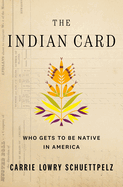
Carrie Lowry Schuettpelz, public policy professor at the University of Iowa, breaks down the nuanced layers of Native American identity in her droll, frank, and funny first book, The Indian Card: Who Gets to Be Native in America, which blends history, social science, and memoir.
More than twice as many people taking the 2020 U.S. Census checked what Schuettpelz calls the "Indian box" to self-report as "American Indian and Alaska Native" as did in 2000. Moreover, the number of people who claimed Native identity far outstripped the actual number of enrolled tribal members in the U.S. Schuettpelz, an enrolled member of the Lumbee Tribe of North Carolina who grew up far away from the Lumbee community, is no stranger to the complexity and contradictions of claiming a Native identity. She set out to explain the census data trend through discussions with tribal members, research via the National Archives and Records Administration, and that "bright beacon in an otherwise dark and stormy sky. I am, of course, talking about Microsoft Excel." Her resulting insight is fascinating, but nothing compares to the intimate stories she shares of people whose lives, families, and identities have been shaped by U.S. and tribal policies regarding who may be legally considered Native American.
Schuettpelz's deep, thought-provoking examination of this often misunderstood topic is illuminating and raw as she combines history with data and personal narrative. In prose infused with humor and vulnerability, she walks readers through tangles both personal and political and shows the human cost of weaponized policy, the questions and loss left in the wake of a decadeslong genocide, and the joy still to be found in the communities that have survived. --Jaclyn Fulwood, blogger at Infinite Reads

